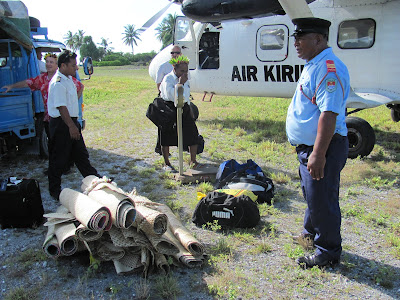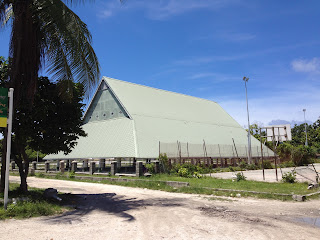On Monday and Thursday, the Air Pacific flight from Fiji arrives at Bonriki International Airport. Anyone who has ever been to Tarawa will smile at the mention of the Airport. While it has a long runway and a newish traffic tower, it has no lights, no fence, it doubles as a road, is the path between two villages, a walking track and a place for 'socialising' at night.
 |
| Air Kiribati in Abemama |
Kiribati Air, which services the Gilbert Islands flies daily, and relies on buzzing the airport prior to landing. A truck drives up and down the runway warning other users and generally it is everyone's understanding that you get off the runway if a plane is landing. I assume dogs and pigs are airport savvy, but I do wonder as they frequently ignore cars on the road to Betio.
 | |||
| Runway open to traffic |
For those who live at the Airport end of Tarawa, you become aware of the routines; Air Pacific Flight is due at 8:00am and you don't go to the airport to collect passengers until you hear it; Air Kiribati leaves as soon as it is light and wends its way home at 6:30pm. If you are lucky enough to be in the air for one of these sunset landings, you have had a glimpse of heaven.
- Is the plane coming? They sometimes don't, although recently they have been reliable.
- What time is it coming? There are frequent changes, including the day, without notice.
- Is it on time?
When all this has been confirmed, you need to decide whether to check in at the airport or Tobaraoi. Tobaraoi provides an excellent service of check-in and coffee, plus a ride to the airport - all in comfortable surrounds and for the bargain price of $7. For those of us who live 5 minutes drive from the airport, it is best to check in very early, (the aim being to snaffle a forward seat), then go home for a coffee, and return to the airport when you hear the plane arrive.
Recently the airport has been undergoing an upgrade of sorts but the crowd control in the arrivals area doesn't include baggage collection or collection of duty free. Despite the difference in the cost and range of alcohol between Fiji and Tarawa, my advice is resist the urge to buy duty free; the wait to collect it, is not worth it. The redeeming feature of the baggage collection exercise is that you are confronted with happy, smiling and helpful I-Kiribati; the baggage handlers and travellers. The 'shit-fight' is only a problem for I-matung; best get over it, and preferably before you leave Arrivals.
 |
| Car Park shopping includes Clavin Klein undies |
Being at the airport, whether arriving, leaving or collecting others, is an excellent opportunity to meet new people, do business, and generally catch up. It is accepted, indeed expected that you talk to everyone and find out their business. I-Kiribati who have no connection to you, will want to talk and find out your story. Likewise I-Matung will also ask what you are doing in Kiribati. There is no such thing as being 'alone'.
Christmas is a time when I-Matung start every conversation with "Are you going home for Christmas?" and "What flight?" Right now we have cyclone Evan bearing down on Fiji and Monday's flight is cancelled putting pressure on Thursday's flight which I am booked on. It may mean devastation for Fiji and loss of life which is more concerning - so we are all working at keeping the possibility of not being home for Christmas in perspective; i.e. 'not that important in the circumstances.'
Merry Christmas and Happy New Year





















